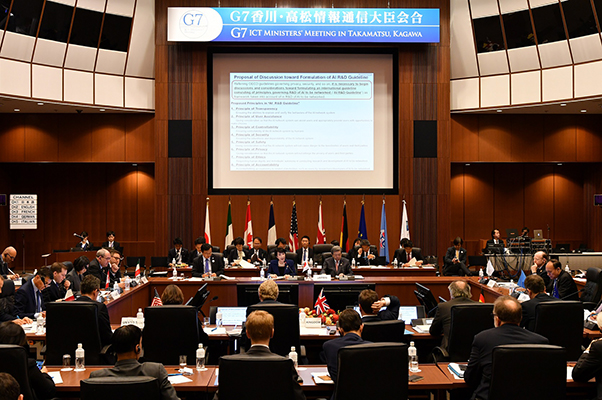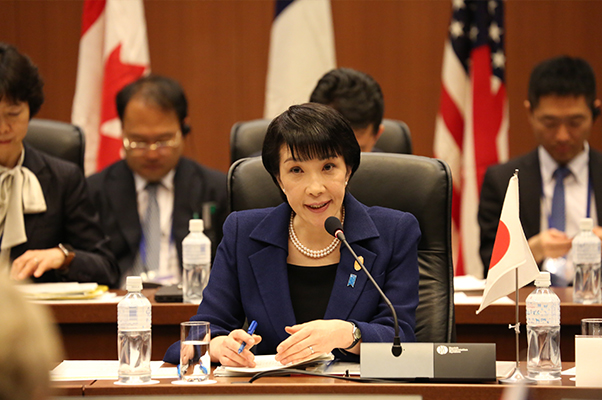G7 ICT Ministers’ Meeting

Outcomes of the G7 ICT Ministers' Meeting in Takamatsu, Kagawa
The G7 ICT Ministers' Meeting in Takamatsu, Kagawa was held over two days, April 29-30, 2016. It was the first time in about 20 years for an ICT Ministers' Meeting to be held by the G7.
During the meeting, there was vigorous discussion on such topics as promoting economic growth and ensuring cybersecurity in a society where Internet of Things (IoT), Artificial Intelligence (AI) and other emerging ICTs are becoming widespread. As a result, we successfully adopted three outcome documents, the Charter, the Joint Declaration and the G7 Opportunities for Collaboration (annexed to the Joint Declaration), which summarized the fundamental principles and action plans for achieving "the Digitally Connected World" where all the people and things are connected globally. The G7, which shares fundamental values such as freedom and democracy, issued a message of unity to the world.
During the meeting, there was vigorous discussion on such topics as promoting economic growth and ensuring cybersecurity in a society where Internet of Things (IoT), Artificial Intelligence (AI) and other emerging ICTs are becoming widespread. As a result, we successfully adopted three outcome documents, the Charter, the Joint Declaration and the G7 Opportunities for Collaboration (annexed to the Joint Declaration), which summarized the fundamental principles and action plans for achieving "the Digitally Connected World" where all the people and things are connected globally. The G7, which shares fundamental values such as freedom and democracy, issued a message of unity to the world.
1. Main points of discussion at the Ministers' Meeting
Discussions were held over four sessions: (1) Innovation and economic growth brought by emerging ICTs; (2) The free flow of information and cybersecurity; (3) Using ICTs to address global challenges and opportunities; and (4) International cooperation and collaboration. The following are the main points from each session.(1) Innovation and economic growth brought by emerging ICTs
- For the purpose of creating innovation with IoT and other emerging ICTs, we agreed to advance international collaboration for promoting IoT through public-private initiatives.
- Japan proposed to conduct a study on the social and economic impacts of networked AI through collaboration including international organizations, and to link this with discussion on possible principles in development of networked AI.
(2) The free flow of information and cybersecurity
- Except for cases with legitimate public policy objectives, we agreed to oppose data localization requirements (domestic installation such as server equipment for providing ICT services)that are likely to hinder the free flow of information.
- We agreed that the G7 would strongly oppose any potential use of ICTs for criminal and terrorist purposes.
- To ensure a safe and secure cyberspace, we agreed to promote initiatives such as research on methods for analyzing trends of cyber attacks and utilization of common metrics for objectively assessing cyber risks.
(3) Using ICTs to address global challenges and opportunities
- We agreed to seek to bring 1.5 billion new Internet users online globally by 2020, through multi-stakeholder efforts.
- Japan proposed the possibility of collaboration within the G7 for promoting the development of quality ICT infrastructure, based on its initiative of "Partnership for Quality Infrastructure".
- We agreed to contribute to realizing "the 2030 Agenda for Sustainable Development" by promoting use of ICTs in areas where the G7 has advanced expertise, such as the ageing society and disaster risk reduction.
(4) International cooperation and collaboration
- We agreed to enhance cooperation and collaboration among the G7 members, and adopted the Charter and the Joint Declaration as outcome documents that summarize the fundamental principles and action plan for this purpose.
- Also we gathered specific initiatives of each G7 member and formulated the G7 Opportunities for Collaboration (annexed to the Joint Declaration) in order to promote mutual cooperation and collaboration involving international organizations.
2. Others
- ○During the Ministers' Meeting, we received reports on the outcomes of the G7 ICT Students' Summit, which was held in December 2015, as well as on the outcomes of the G7 ICT Multi-Stakeholders' Conference, which was held in parallel with the Ministers' Meeting and with the participation of experts from industry, academia and government.
- Outline of the G7 ICT Students' Summit
http://www.soumu.go.jp/joho_kokusai/g7ict/english/sict.html
- Outline of the G7 ICT Multi-Stakeholders' Conference (Executive Summary of The Discussion)
http://www.soumu.go.jp/joho_kokusai/g7ict/english/msc.html
- ○Taking the opportunity of the Ministers' Meeting, Sanae Takaichi, the Japanese Minister for Internal Affairs and Communications held bilateral meetings with Catherine Novelli (U.S. Under Secretary for Economic Growth, Energy, and the Environment), Ed Vaizey (U.K. Minister of State for Culture and the Digital Economy), and Andrus Ansip (Vice-President of the European Commission). An outline of those meetings is annexed.
(Reference) Attendees at the G7 ICT Ministers' Meeting in Takamatsu, Kagawa
- ○G7
- ○Observers
International Telecommunication Union (ITU): Houlin ZHAO, ITU Secretary-General
Organisation for Economic Co-operation and Development (OECD): Andrew W. WYCKOFF, Director for Science, Technology and Innovation
| Japan: | Sanae TAKAICHI, Minister for Internal Affairs and Communications; Motoo HAYASHI, Minister of Economy, Trade and Industry; Keiichi KOSHIMIZU, Parliamentary Vice-Minister of Internal Affairs and Communications |
| Italy: | Antonello GIACOMELLI, State Secretary for Economic Development |
| Canada: | Éric DAGENAIS, Assistant Deputy Minister of Innovation, Science and Economic Development Canada |
| US: | Pascal FAURE, Director General for Enterprise, Ministry of the Economy, Industry and the Digital Sector |
| UK: | Catherine A. NOVELLI, Under Secretary for Economic Growth, Energy, and the Environment, Department of State |
| Germany: | Matthias MACHNIG, State Secretary at the Federal Ministry for Economic Affairs and Energy |
| EU: | Andrus ANSIP, Vice-President of the European Commission |






